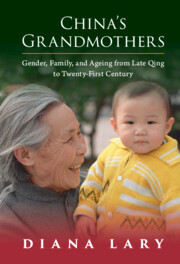Book contents
- China’s Grandmothers
- China’s Grandmothers
- Copyright page
- Dedication
- Contents
- Illustrations
- Tables
- Boxes
- Acknowledgements
- Preface
- Introduction
- 1 Precious Treasures
- 2 Archetypes and Images of Grandmothers
- 3 Baby Seekers/Baby Lovers
- 4 Child Care
- 5 Ruling the Roost
- 6 Old Age
- 7 Grandfathers
- 8 Transmitters of Culture
- 9 Absent Parents
- 10 Left-Behind Children
- 11 The Pleasures of Old Age
- 12 Leaving This Life
- 13 The Future of the Old
- 14 Personal Notes
- Afterword
- Notes
- Bibliography
- Index
10 - Left-Behind Children
Published online by Cambridge University Press: 14 April 2022
- China’s Grandmothers
- China’s Grandmothers
- Copyright page
- Dedication
- Contents
- Illustrations
- Tables
- Boxes
- Acknowledgements
- Preface
- Introduction
- 1 Precious Treasures
- 2 Archetypes and Images of Grandmothers
- 3 Baby Seekers/Baby Lovers
- 4 Child Care
- 5 Ruling the Roost
- 6 Old Age
- 7 Grandfathers
- 8 Transmitters of Culture
- 9 Absent Parents
- 10 Left-Behind Children
- 11 The Pleasures of Old Age
- 12 Leaving This Life
- 13 The Future of the Old
- 14 Personal Notes
- Afterword
- Notes
- Bibliography
- Index
Summary
In the Reform Era there has been a dramatic increase in the number of peasant children left behind in ‘villages with an empty heart’, missing the middle generation of a family. These are the children of hundreds of millions of migrant workers, who have left rural China to work in more developed areas. Residence restrictions (hukou) prevent them from taking children with them. As many as 70 million are left behiind at the moment, in the care of grandmothers. These women, without whom China’s economic boom would have been impossible, care for their grandchildren for fifty weeks of the year. The parents send money home, and may eventually return, but in the meantime for the grandmother caring for several grandchildren is hard.
Left-behind children do not have the educational advantages of urban children. Rural schools are poor; free education only goes up to junior middle school. Official pronouncements tend to be critical of grandparents for bringing up children ‘without culture’. The state is concerned that the children will grow up aware of their disadvantages, and may be difficult or even rebellious. In China’s history disadvantaged young men have turned into rebels; this includes many who joined the Communist Party.
- Type
- Chapter
- Information
- China's GrandmothersGender, Family, and Ageing from Late Qing to Twenty-First Century, pp. 156 - 171Publisher: Cambridge University PressPrint publication year: 2022

